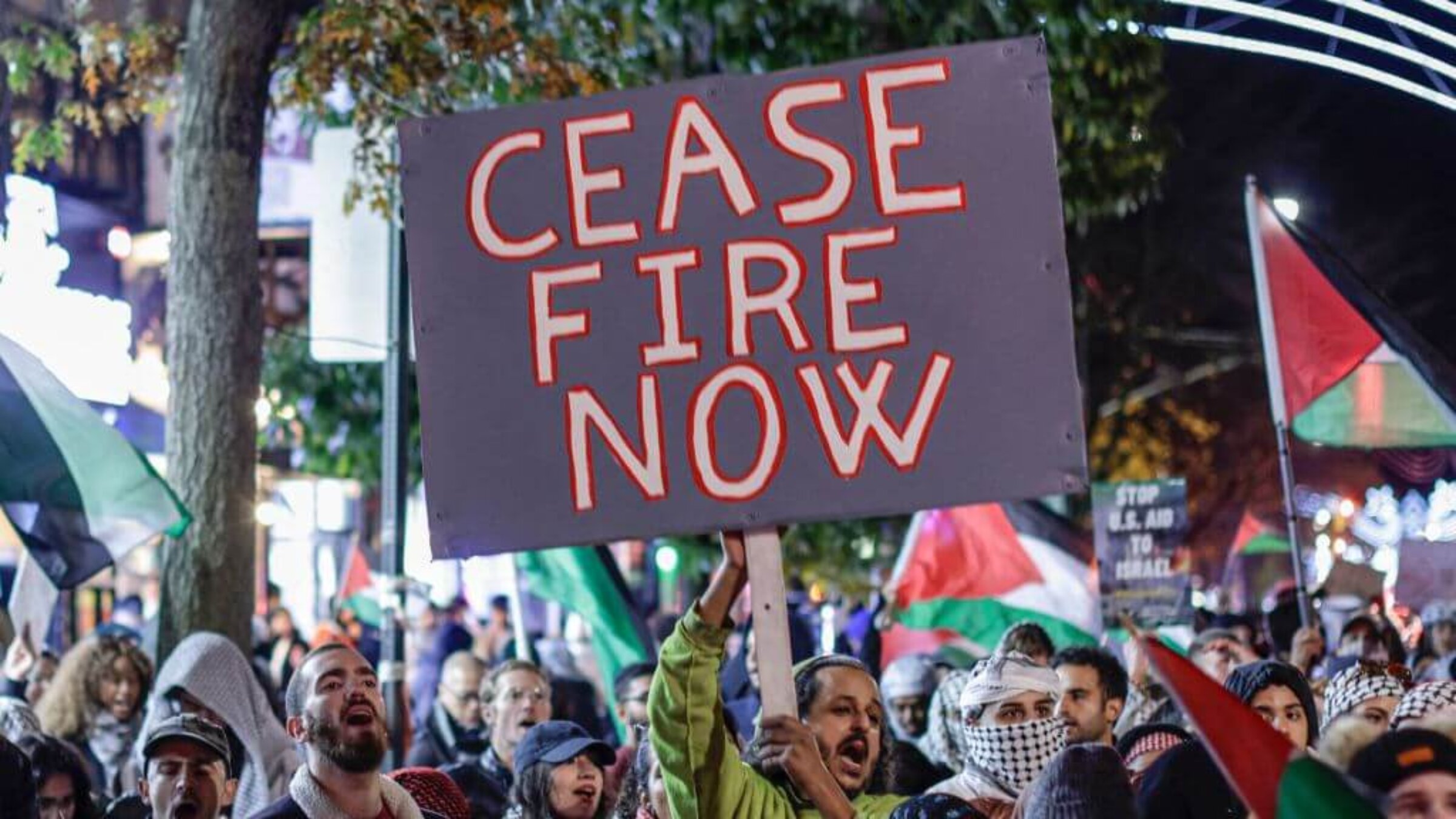A ceasefire is needed in Gaza. My college shouldn’t call for one
Campuses must remain places for free expression and open inquiry

Demonstrators call for a ceasefire in New York City on Nov. 18, 2023. Photo by Kena Betancur/AFP via Getty Images
A student at Hampshire College, where I graduated in 1993 and served as a trustee for four years, emailed me over the weekend to ask if I would add my name to the 361 students, staff and faculty who had thus far signed a letter urging administrators to, as they put it, “join the national call for a ceasefire in Gaza and the West Bank.”
I am appalled by Israel’s actions in Gaza — just as I am appalled by the Hamas attack that precipitated them. I am equally appalled by Israel’s actions in the occupied West Bank, including the expansion of settlements and violence against Palestinian civilians.
I have been a critic of Israel’s handling of the Palestinian conflict for the majority of my adult life. Still, I turned the student down.
Because while I want a ceasefire, I don’t think Hampshire College has any business demanding one. (Back in October, I expressed a similar sentiment for those demanding that art museums and galleries make solidarity statements supporting Israel.)
I object to such institutional statements because they become an implicit litmus test for the views of everyone affiliated with the school. Such litmus tests close off exactly the kind of free expression and open inquiry that schools like Hampshire are there to provide.
Reasonable people can have good-faith disagreements about the situation in Israel, Gaza and the West Bank. Indeed, I have family, friends and colleagues with whom I have such disagreements. Unfortunately, the effect of colleges making such statements is to inherently polarize and ostracize anyone whose views differ from the stated orthodoxy.
Hampshire has been home for many years to the Peace and World Security Studies program, which is designed to discuss just these kinds of conflicts and the United States’ role in them. An institutional statement advocating a particular action in one such conflict can only have a chilling effect on such discussions, foreclosing necessary debate because people do not want to be called out for having differing opinions. That is the opposite of what is required for a meaningful liberal arts education.
Such statements might be appropriate for nonprofits dedicated to addressing global conflicts or organizations focused on civil rights. They might be fine for religious groups. And, of course, they are entirely appropriate for national governments.
But educational institutions play a different role in a civil society. They serve to educate and train the people who go on to lead and serve such organizations — and those people benefit from receiving an education based on open inquiry rather than indoctrination.
I also oppose such statements because they are completely pointless. If I thought for even one second that Hampshire College releasing a ceasefire statement would have some impact on the conflict, I would waive my above objections in order to save lives. But I know it would — and should — have zero effect on the policies of the U.S. or Israeli governments.
That is in sharp contrast to a student movement of a prior generation, calling on institutions of higher education to divest from apartheid South Africa. Though it was before my time, I’m proud that Hampshire College was the first school in the U.S. to do so, back in 1977.
But while the Students for Justice in Palestine chapter pushing for the Hampshire ceasefire statement may see the situations as parallel, they are not — regardless of whether you believe Israel is also committing the crime of apartheid.
Because what happened in 1977 was not a statement from Hampshire; it was an action — divestment. The college similarly divested from fossil fuels in 2017, when I was on its board, and also holds no investments directly related to the U.S. prison system. Such actions do not have the same kind of chilling effect on open inquiry that sweeping statements do.
The petition the Hampshire student asked me to sign about Gaza feels profoundly narcissistic. It may make the student and their SJP friends feel better, as if they are doing something; but this confuses putting one’s name on a letter or petition with actually taking action. It is “clicktivism,” the laziest form of activism.
Back in 1977, a group of students occupied the building housing Hampshire’s main administrative offices to demand faster attention to their call for divestment. Students at colleges including Haverford and Swarthmore have similarly staged sit-ins this academic year to protest the war in Gaza.
However, I do not think Hampshire’s SJP members should attempt a similar stunt; there are better and more productive ways for them to spend their time. Instead of asking me and other alums to sign a petition calling on Hampshire to make a statement, they could ask us to call our congressional representatives and urge them to put pressure on Israel to end the fighting. SJP could organize a protest at the office of a local member of Congress, or go to a nearby military base to protest U.S. support of the Israel Defense Forces — as classmates of mine did to protest the first Gulf War in 1991 — or raise funds to get relief to Gaza residents.
But a statement is as meaningful as the browser tab in which you might read it — and gone as quickly. Were Hampshire College to cave to these demands, it would be confusing a nonexistent bully pulpit for meaningful work to address this conflict.
Instead, I hope the college — which prides itself on teaching students who seek to make change in the world — can see this as a teachable moment.






















